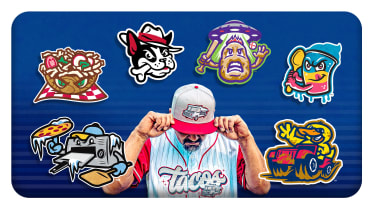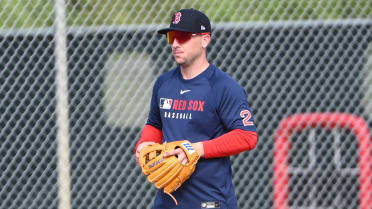5 reasons the Angels make sense for Ohtani
Across six seasons with the Angels, Shohei Ohtani has turned into baseball's biggest superstar and arguably the sport's best player. But his tenure with the team could be at an end.
Ohtani is a free agent, and there is sure to be spirited competition for his services, with an enormous contract required to land him. Of course, few were picking the Angels to sign Ohtani in the first place, back in the 2017-18 offseason, and they did just that.
So while the Angels may not be favorites in this winter's Ohtani sweepstakes, they also can't be dismissed. There are still factors pointing toward a possible Ohtani return.
Here then are five reasons why the Angels make sense for Ohtani this time around.
1. We know Ohtani can perform at his best with the Angels
Purely from an individual perspective, it's hard to imagine that Ohtani could've reached his goals more convincingly in an Angels uniform. In Anaheim, he became arguably the best player in the Majors and a face of the game, transcending the casual baseball viewing audience.
But it's important to remember that this outcome seemed far from certain initially. To their credit, the Angels stuck with Ohtani even when there might have been doubts about his viability as a two-way player, such as when Ohtani struggled at the plate in his first Spring Training, prompting some scouts to assert that he needed Minor League seasoning to become a productive Major League hitter.
They did the same when Ohtani underwent Tommy John surgery and later entered the 2021 season with just 53 1/3 big league innings under his belt, including 1 2/3 in 2019-20 combined. At that point, there was legitimate reason to think Ohtani could profile better solely as a designated hitter or position player, yet the Angels not only stuck with a two-way plan but also freed him of some of the restrictions he had from 2018-20, allowing him to reach his ceiling as a two-way threat.
Ohtani likely would have turned into a dominant force regardless of where he signed back in 2017. It certainly didn't hurt that the Angels gave Ohtani full autonomy though, especially later in his tenure. That trust and belief could help their pursuit this offseason.
2. Familiarity, comfort and an established relationship
After Ohtani originally signed, agent Nez Balelo said that his client "felt a strong connection with the Angels and believes they can best help him reach his goals in Major League Baseball." Things obviously could have changed in the last six years -- when the Angels played a lot of non-competitive baseball -- but it's possible that a strong relationship was fostered between player and team in that time. So while getting into Ohtani's head is a bit of a guessing game, that still could loom large.
Then there is the comfort factor.
Ohtani hasn't exactly avoided the spotlight as a global star -- he is, after all, a prominent New Balance athlete and did an extensive profile with GQ Sports. But when it comes to his conversations with the local media, Ohtani is relatively guarded, and that has suited him fine so far.
While the Angels don't exactly play in a small market, some other teams that figure to bid on Ohtani have a significantly larger media presence that typically demands more interaction. The pressure in New York, or even up the freeway in Los Angeles, would be more intense. It was no secret that Ohtani preferred a West Coast team in a smaller market when he originally signed with the Angels, and those feelings still could play a role.
3. The Angels have never shied away from a big contract
This might possibly be the most important point in considering an Ohtani return to the Angels.
While previous mega contracts haven't gone according to plan for the Angels -- and have certainly played a role in their lack of success in the last decade -- that same history of big spending helps the Angels here. Mike Trout's 12-year, $426.5 million deal remains the largest MLB contract in terms of total dollars while Anthony Rendon's seven-year, $245 million contract and Albert Pujols's 10-year, $240 million deal are both top-20 contracts.
The Angels already have significant payroll commitments in 2024, including more than $75 million for Trout and Rendon alone, so there could be reservations about adding a massive Ohtani deal to that equation. At the same time, the Angels under owner Arte Moreno have shown a willingness to spend at the top of the market for premium players, in a way that not many other teams have.
4. Avoiding a rival team signing him
If Ohtani doesn't end up signing with the Angels, it'll hurt regardless of where he goes. Seeing your generational superstar leave at the peak of his powers is going to sting in any context.
Watching Ohtani sign with an AL West rival like the Mariners or Rangers or a Southern California competitor like the Dodgers or Padres, however, would be even tougher to stomach. Those teams were four of the seven finalists for Ohtani in 2017 and could very well be in the mix again this time.
When the Angels hung on to Ohtani at this summer's Trade Deadline, there was plenty of talk about Moreno and general manager Perry Minasian not wanting to be remembered for trading away a generational superstar. Allowing Ohtani to leave as a free agent only for him to sign with a rival would be nearly as tough, and that should add some extra incentive for the Angels to be aggressive.
5. The Angels need Ohtani
After seeing what Ohtani did in an Angels uniform the last three years, it's difficult to envision how much different the team would look without him moving forward.
Granted, the Angels haven't been fielding competitive teams even with Ohtani in the fold. Despite Ohtani playing at his pinnacle the last three years, they topped out at 77 wins in 2021 and haven't won 80 games since his rookie year.
But Ohtani's value and appeal transcends team success. The Angels might not be able to build a sustainable winning team -- with or without Ohtani -- but that doesn't mean he hasn't brought unmatched value and entertainment to a team that desperately needed it the last half-decade.
Despite their lack of success, Ohtani has made the Halos a team worth watching in recent years. Every Ohtani start, whether as a pitcher, a hitter, or both, was instant must-see television. For the Angels, Ohtani became an incredibly marketable superstar the likes the organization has never seen. Beyond anything, Ohtani has been the attraction in Anaheim, even more than Trout.
Other teams could undoubtedly use Ohtani. Heck, every team should be in on the Ohtani sweepstakes. But the Angels need Ohtani.
Brent Maguire is a reporter for MLB.com.




